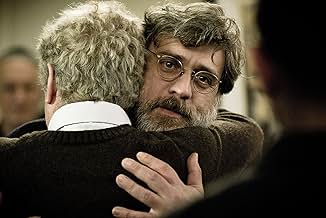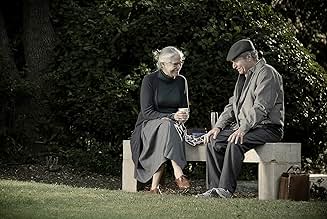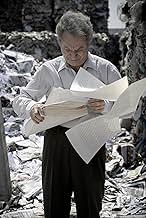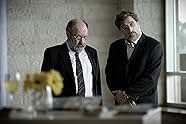Aggiungi una trama nella tua linguaEliezer and Uriel Shkolnik are father and son as well as rival professors in Talmudic Studies. When both men learn that Eliezer will be lauded for his work, their complicated relationship re... Leggi tuttoEliezer and Uriel Shkolnik are father and son as well as rival professors in Talmudic Studies. When both men learn that Eliezer will be lauded for his work, their complicated relationship reaches a new peak.Eliezer and Uriel Shkolnik are father and son as well as rival professors in Talmudic Studies. When both men learn that Eliezer will be lauded for his work, their complicated relationship reaches a new peak.
- Regia
- Sceneggiatura
- Star
- Candidato a 1 Oscar
- 14 vittorie e 9 candidature totali
- Eliezer Shkolnik
- (as Shlomo Bar Aba)
- Yehudit Shkolnik
- (as Alisa Rosen)
- Dikla Shkolnik
- (as Alma Zak)
- Committee Member
- (as Shmulik Shilo)
- Committee Member
- (as Albert Illouz)
- TV Host
- (as Jacky Levy)
Recensioni in evidenza
In a most ingenious way we are introduced to the two main characters - father and son, both professors in the Talmud department of the Hebrew University in Jerusalem. The film opens on the confused and somewhat unattached facial expression of the seated father Eliezer Shkolnik (Shlomo Bar Aba) as he listens to his ebullient son Uriel Shkolnik (Lior Ashkenazi) being inducted into the prestigious Israeli academic union. Uriel's acceptance speech reflects his childhood when his father informed him upon questioning that he was a 'teacher' - an occupation the young Uriel found embarrassing at the time, but now honors his father for this guidance. After the ceremony we slowly discover that there is a long-standing rivalry between father and son. Uriel has an addictive dependency on the embrace and accolades that the establishment provides, while Eliezer is a stubborn purist with a fear and profound revulsion for what the establishment stands for, yet beneath his contempt lies a desperate thirst for some kind of recognition: his only clam to fame after long years of intensive research is that the man who published his findings mentions Eliezer in a footnote. When it comes times for the Israel Prize, Israel's most prestigious national award, to be awarded, a clerical error results in a telephone call informing Eliezer that he has won, while in reality the award was meant for his son Uriel. How this error is resolved open all manner of windows for examining family relationships, fame, pure academia, and forgiveness.
The film is an unqualified success. Lior Ashkenazi (so well remembered from 'Walk on Water' and 'Late Marriage' among others) gives a bravura performance and that of Shlomo Ben Aba balances it in quality. The supporting cast is strong. Joseph Cedar has produced a fine film very much enhanced by the brilliance of the cinematography that tells the story as much as the dialogue.
Grady Harp
The premise is fairly straightforward. A father and son are both philogy professors at the Hebrew University of Jerusalem. Eliezer Shkolnik is an old school researcher who believes findings are only valid if research is conducted in the proper scientific method, while his son, Uriel, follows the more modern philosophy. Eliezer loathes the popularity and acceptance of the current methods, and is so stubborn he even refuses to cancel one of his classes even though only one student is signed.
Having background on research methods or philology is not necessary however, when it comes to following along the movie. Shlomo Bar'aba and Lior Ashkenazi, as Eliezer and Uriel respectively, both make sure to humanize their characters and portray their conflicting ideals by showcasing conflicting personalities as wells.
The plot gets really interesting when Eliezer finds out he has been voted the winner of the Israel Prize, forcing him to rethink how he feels his colleagues, and the field in general. However, Uriel soon gets a phone call that will shake things up even more.
Unfortunately, Footnote does not deliver a satisfying conclusion, at least not a memorable one. The tension is slowly built up really well as the film cuts deeper into the plot, yet when the time comes for a huge clash, the film ends up kinds of just floating around not knowing the right time to fade out. However, the meat of the film is too good to be ignored, as both Bar'aba and Ashkenazi deliver performances you won't soon forget.
Most parents wish for true happiness for their children. If the professional success of their offspring far exceeds their own ... it is a reason to swell with parental pride. But what happens when father and son choose similar paths? What happens when animosity builds as the father's life work (30 years of research) is deemed unnecessary and irrelevant? What happens when the son becomes publicly revered and adored for his populist writing? Well, in the case of father Eliezer (Shlomo Bar-Aba) and son Uriel (Lior Ashkenazi), we get strained relations and a thesis on the pitfalls of pride and ego.
All of that is sufficiently fascinating for a story, but here we get an even more severe test of human nature. The father is erroneously informed that he has won the prestigious Israel Award, providing vindication and meaning to his work and well, his being. See, the award was supposed to go to the other Professor Shkolnik ... yes, his son. This much is shown in the trailer, but the true guts of this story is what happens after this mistake.
There are a few tremendous scenes in the film, but two really jumped out for me. In an early scene, the son is receiving yet another reward and he is attempting to provide some credit for his father's inspiration. However, the words seem to add credence to the irrelevancy instead. The best part? The camera never leaves the face of the father and he sits quietly listening in immeasurable pain. The other scene takes place in a beyond cramped meeting room for the Award committee to discuss the mistake with Uriel. The manner it is filmed and the choreography more than make up for the fact that the group of brilliant people never thought to find a more suitable meeting place.
The score of the film is one that I would appreciate more without having the film playing. The music is wonderful, but often distracting to the moment. It is interesting to note how it changes along with the posture and walking pace of Eliezer after he is informed of his award. One need not be an academic researcher or writer to understand the damaged relationship between father and son ... and how it has impacted wives, mothers and sons. That's a story that is painful in any language.
Lo sapevi?
- QuizJoseph Cedar is the son of the Israel Prize recipient, Haim Cedar.
- BlooperAt around 38:00, when Uriel enters the room that the committee is meeting in for the first time, he can open and close the door easily. But when he returns with a chair a few seconds later, suddenly there's not enough space to close it, despite his chair not being in the way.
- Citazioni
Uriel Shkolnik: [to a student] I will tell you something that my father told me once: Your work has many things correct and many things innovative. Unfortunately, the innovative things are not correct and the correct things are not innovative.
- Curiosità sui creditiThe credits for the major cast and crew members all have the initial letters of their names in bold, echoing the plot device that causes the confusion between the father and son.
- ConnessioniFeatured in At the Movies: Cannes Film Festival 2011 (2011)
I più visti
- How long is Footnote?Powered by Alexa
Dettagli
Botteghino
- Lordo Stati Uniti e Canada
- 2.007.758 USD
- Fine settimana di apertura Stati Uniti e Canada
- 47.528 USD
- 11 mar 2012
- Lordo in tutto il mondo
- 2.451.259 USD
- Tempo di esecuzione1 ora 47 minuti
- Colore
- Mix di suoni
- Proporzioni
- 2.35 : 1
Contribuisci a questa pagina





































